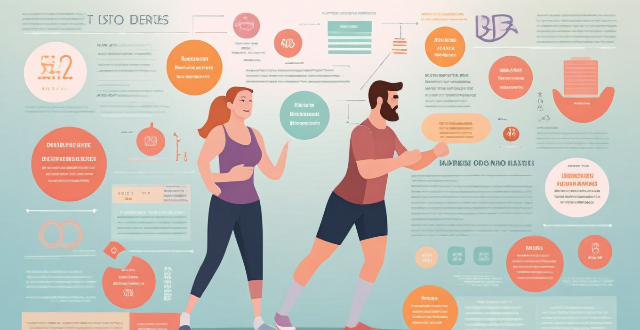Health Bones

How does exercise contribute to bone health ?
Exercise contributes to bone health by increasing bone density, improving balance and coordination, strengthening muscles, improving posture, reducing inflammation, and enhancing cardiovascular health. This reduces the risk of osteoporosis, fractures, back pain, and other health issues.

Is weight-bearing exercise really necessary for bone health ?
Weight-bearing exercises are often recommended for maintaining bone health, but is it really necessary? Let's explore this topic in detail. Weight-bearing exercises include any activity that requires you to carry your own body weight, such as walking, jogging, dancing, climbing stairs, and weightlifting. These exercises can help strengthen bones and muscles, improve balance and coordination, and reduce the risk of falls. Maintaining healthy bones is crucial for overall health and well-being. Strong bones provide support and protection for your body, allowing you to move with ease and perform daily activities without pain or discomfort. Additionally, having strong bones can help prevent fractures and other injuries. Weight-bearing exercises have numerous benefits on bone health, including stimulating bone growth, improving bone density, reducing the risk of falls and injuries, and promoting overall health and well-being. However, there are some alternatives to weight-bearing exercise that may be beneficial for people who cannot engage in these types of activities. These include resistance training, yoga or Pilates, and swimming. In conclusion, weight-bearing exercises are highly recommended for maintaining bone health due to their numerous benefits on bone growth, density, and overall health and well-being. However, there are alternative exercises that may be beneficial for people who cannot engage in weight-bearing activities. It's always best to consult with a healthcare professional before starting any new exercise program.

How often should I exercise to maintain good bone health ?
Exercise is crucial for maintaining good bone health, but the frequency and intensity required vary depending on individual factors. Regular exercise strengthens bones, improves balance, and reduces the risk of falls and fractures. The recommended exercise guidelines for adults are at least 150 minutes of moderate-intensity aerobic exercise per week and two or more days of strength training per week. For older adults, it's important to consult with a healthcare professional before starting any new exercise program. Other factors that impact bone health include diet, smoking, and overall health status.

What types of exercises are best for improving bone density ?
Improving bone density is crucial for maintaining overall health and preventing conditions such as osteoporosis. Engaging in specific types of exercises can significantly enhance bone density, making them an essential component of a healthy lifestyle. Here are some of the best exercises for improving bone density: 1. **Weight-Bearing Exercises**: These activities put stress on the bones, which stimulates them to grow stronger. Examples include walking, jogging, stair climbing, and strength training. 2. **High-Impact Exercises**: These exercises involve jumping or quick, forceful movements that create a significant impact on the bones. Examples include jumping jacks, burpees, box jumps, and plyometrics. 3. **Resistance Training**: This type of training involves using external resistance, such as weights or resistance machines, to challenge the muscles and bones. Key exercises include squats, deadlifts, bench press, and rows. 4. **Isometric Exercises**: While not as directly beneficial for bone density as the previous categories, isometric exercises can still play a role in maintaining and improving overall strength, which contributes to better bone health. Examples include planks, wall sits, and push-up holds. Incorporating a combination of these exercises into your routine can significantly improve bone density over time. It's essential to consult with a healthcare professional before starting any new exercise program, especially if you have pre-existing health conditions or concerns about your bone health.

How does a balanced diet impact women's bone health ?
Balanced diet is crucial for women's bone health, including preventing osteoporosis. Key nutrients are calcium, vitamin D, protein, and phosphorus. Fruits and vegetables also support overall well-being.

How can women maintain bone health as they age ?
Maintaining bone health is crucial for women as they age. Here are some tips to help them keep their bones strong and healthy: 1. Get Enough Calcium and Vitamin D: Women should aim to get at least 1,200 milligrams of calcium per day through food sources like dairy products, leafy greens, and fortified foods. Vitamin D helps the body absorb calcium, and it's recommended that women get at least 600-800 IU of vitamin D daily from sunlight, food, or supplements. 2. Engage in Weight-Bearing Exercises: Weight-bearing exercises like walking, jogging, dancing, or lifting weights can help strengthen bones by putting stress on them. This stress signals the body to build more bone, making them stronger over time. Aim for at least 30 minutes of weight-bearing exercise most days of the week. 3. Practice Good Posture and Body Mechanics: Good posture and body mechanics can help prevent fractures by reducing the risk of falls. Stand tall with your shoulders back and your head held high. Use proper body mechanics when lifting heavy objects, bending, or reaching overhead. 4. Quit Smoking and Limit Alcohol Intake: Smoking has been linked to decreased bone density and an increased risk of fractures. If you smoke, consider quitting to improve your bone health. While moderate alcohol consumption may not harm bones, heavy drinking can lead to bone loss. Stick to no more than one drink per day for women. 5. Talk to Your Doctor About Bone Health: As women age, it's important to discuss bone health with a healthcare provider. They may recommend a bone density test to assess your risk of osteoporosis and suggest lifestyle changes or medications if needed. If you have a family history of osteoporosis or other risk factors, your doctor may recommend starting bone-building medications earlier rather than waiting until menopause or later life stages.

Can resistance training help improve bone density in older adults ?
Resistance training has been shown to have a positive impact on improving bone density in older adults. This form of exercise strengthens the muscles and bones, reducing the risk of osteoporosis and fractures. To start resistance training, it is important to consult with a doctor, begin slowly, focus on compound movements, incorporate weight-bearing exercises, and seek professional guidance for safety and effectiveness. Consistency is key in achieving optimal results.

What exercises are beneficial for women's health ?
Regular physical activity is crucial for women's health, preventing chronic diseases, improving mental health, and boosting self-esteem. Aerobic exercises like running, swimming, and cycling are great for cardiovascular health and weight management. Strength training exercises such as weightlifting, resistance bands, and bodyweight exercises can improve bone density and reduce the risk of osteoporosis. Yoga helps to improve flexibility, reduce stress, and enhance mental clarity, while Pilates focuses on core strength, flexibility, and balance. Incorporating these exercises into a fitness routine can lead to improved cardiovascular health, stronger bones and muscles, reduced stress levels, and enhanced overall well-being.

What are the essential nutrients for women's health ?
Essential Nutrients for Women's Health Women's health requires attention to various aspects of nutrition, including essential nutrients such as calcium, iron, folic acid, vitamin D, omega-3 fatty acids, vitamin B12, fiber, vitamin C, zinc, magnesium, iodine, vitamin E, vitamin A, copper, choline, selenium, and potassium. These nutrients are crucial for maintaining good health, building and maintaining strong bones and teeth, making hemoglobin, preventing neural tube defects in developing babies, supporting bone and immune system health, supporting heart health and brain function, aiding digestion, helping form collagen in skin, important for immune system function, involved in more than 300 bodily processes, essential for thyroid function, acts as an antioxidant in the body, important for vision, helps the body form red blood cells, important for brain development and health, and acts as an antioxidant in the body. A balanced diet rich in these essential nutrients is crucial for women's health, and it's important to consult with a healthcare provider or a registered dietitian to ensure individual nutritional needs are met.

What are the benefits of strength training for overall health ?
Strength training offers numerous benefits for overall health, includingStrength training offers numerous benefits for overall health, includingurance, increased bone density Incorporating strength training into your fitness routine can help you achieve a healthier, stronger, and happier life.

What are the key indicators of good personal health ?
Good personal health involves taking care of both physical and mental well-being. Key indicators include regular exercise, a balanced diet, adequate sleep, stress management, regular check-ups, and mental well-being. By focusing on these aspects, you can lead a fulfilling life with improved overall health and well-being.

Can exercise prevent osteoporosis ?
Exercise plays a crucial role in maintaining healthy bones by increasing bone density and strength. Effective exercises for preventing osteoporosis include weight-bearing exercises, strength training, balance exercises, high-impact exercises, and flexibility exercises. Incorporating these exercises into your routine can help reduce the risk of osteoporosis and maintain strong bones throughout your life.

How does hydration impact athletic performance and health ?
Hydration is crucial for athletic performance and health. Adequate hydration maintains energy levels, muscle function, joint lubrication, heart rate, and cognitive function during exercise. Dehydration can lead to fatigue, muscle cramping, increased heart rate, impaired cognitive abilities, and decreased physical performance. Proper hydration also aids digestion, kidney function, skin health, immune system function, and body temperature regulation. Chronic dehydration can increase the risk of kidney stones, digestive issues, weakened immune system, and other health problems. Therefore, it is essential for athletes to stay well-hydrated to achieve optimal performance levels and support their overall health.

Are there specific supplements recommended for women's health upkeep ?
The article provides a summary of the top supplements recommended for women's health, including Vitamin D, Calcium, Iron, Folic Acid, and Omega-3 Fatty Acids. These supplements support bone health, muscle function, immune function, cardiovascular health, cognitive function, and overall energy levels. The article emphasizes the importance of consulting with a healthcare provider before starting any new supplement regimen to ensure safety and effectiveness.

At what age should I start focusing on bone-strengthening exercises ?
Maintaining bone health is crucial at every stage of life. Ideally, it's never too early to start thinking about bone-strengthening exercises. For children and adolescents, encourage physical activities that promote bone health. For adults, continue regular exercise and maintain a balanced diet. After 50, focus on resistance training, weight-bearing exercises, and balance training. Starting young with general physical activity and incorporating specific exercises as you age is essential for maintaining bone density and preventing conditions like osteoporosis.

What is the difference between cardiovascular and resistance training in health management ?
The text discusses the differences between cardiovascular and resistance training, highlighting their unique benefits and examples of each. Cardiovascular training strengthens the heart, aids in weight management, and improves endurance, while resistance training enhances muscle strength, bone density, and metabolism. Combining both types of exercise leads to a well-rounded fitness regimen that addresses multiple aspects of health, including endurance, strength, flexibility, and balance. The text suggests ways to incorporate both forms of exercise into a workout routine for optimal health management.

How does exercise affect bone remodeling ?
Exercise is crucial for maintaining bone health by stimulating bone remodeling, a continuous process of breaking down and rebuilding bones. This process is essential for maintaining bone density and strength, preventing osteoporosis, and other bone-related diseases. Regular exercise increases the activity of osteoblasts and reduces the activity of osteoclasts, leading to improved bone density and strength. Weight-bearing exercises, resistance training, balance exercises, and high-intensity interval training are effective ways to maintain bone health.

What is the impact of competitive sports on children's physical development ?
Competitive sports can have both positive and negative impacts on children's physical development, including improved cardiovascular health, muscle strength, flexibility, coordination, healthy weight management, bone health, overuse injuries, performance pressure, and safety concerns. It is important to monitor their involvement carefully to avoid potential negative consequences and ensure they reap the rewards without suffering from the drawbacks of competitive sports.

How can women ensure they are getting enough calcium in their diet ?
Calcium is crucial for women's health, especially for maintaining strong bones and teeth. Women can ensure they are getting enough calcium by knowing their requirements, including calcium-rich foods in their diet, considering supplements if needed, and maintaining a healthy lifestyle with regular exercise and limited alcohol consumption. It's important to consult with a healthcare professional for personalized advice.

Are there any risks associated with high-impact exercises for bone health ?
High-impact exercises, such as jumping and running, are recommended for bone health but come with risks like overuse injuries, acute injuries, joint problems, and cardiovascular risks. Mitigating these risks involves gradual progression, proper technique, adequate rest, appropriate gear, and medical consultation.

How does vaccine distribution affect public health ?
Vaccine distribution is crucial for global health, reducing disease incidence and healthcare costs while increasing productivity. Challenges include inequitable access, logistical complexities, and public perception issues.

What are the benefits of a plant-based diet for women ?
A plant-based diet offers numerous health benefits for women, including improved cardiovascular health, weight management, cancer prevention, bone health, reproductive health, digestive health, skin health, and mental wellbeing. It is important to consult with a healthcare professional or registered dietitian when making significant dietary changes.

What is the role of the World Health Organization (WHO) in promoting global health ?
The World Health Organization (WHO) plays a crucialThe World Health Organization (WHO) plays a crucial by providing leadership, setting norm WHO's work is focused on improving health outcomes worldwide through various activities such as convening stakeholders, establishing international standards for health, generating scientific knowledge to inform policy decisions, providing technical support to countries, and monitoring global health trends.

How can countries improve their preparedness for global health emergencies ?
Countries can improve their preparedness for global health emergencies by strengthening healthcare infrastructure, developing surveillance and early warning systems, enhancing international cooperation, improving public health education and awareness, and establishing contingency plans and policies.

What are the long-term health consequences of climate change ?
The long-term health consequences of climate change are multifaceted and can be categorized into several key areas, including increased frequency and severity of heat waves, extreme weather events, spread of diseases, air quality issues, food insecurity, and mental health impacts. These effects have far-reaching implications for public health and require urgent action to mitigate their impact.

What are the benefits of taking sports supplements ?
Sports supplements offer a range of benefits for athletes, from improved performance and faster recovery to optimized nutrition and health maintenance. They can also enhance mental clarity, provide convenience, aid in weight management, and support hormonal balance. It's crucial to consult with a healthcare professional before using any supplements to ensure they are safe and effective for individual needs and goals.

Why is vaccine equity important for global health ?
Vaccine equity is crucial for global health as it ensures fair distribution of life-saving vaccines worldwide. It helps prevent disease outbreaks, reduce health inequalities, promote economic stability, and improve overall health outcomes. By ensuring everyone has access to vaccines, we can create a healthier world for all.

How does sea level rise impact public health, especially in coastal areas ?
Sea level rise, driven by global warming and climate change, poses significant threats to public health in coastal areas through flooding and storm surge, waterborne diseases, environmental health hazards, mental health concerns, economic impacts, and social determinants of health. Addressing this challenge requires a multifaceted approach that includes adaptation strategies, improved infrastructure resilience, and mitigation efforts to reduce greenhouse gas emissions.